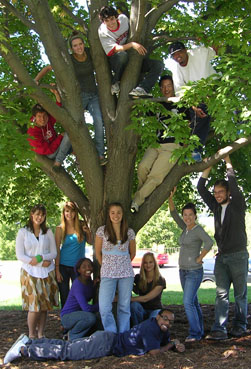
Students protesting that their course work is too easy might not rise to the level of “human bites dog” on the scale of incredulous acts. But it’s not something one hears every day.
When University of Wisconsin-Madison administrators in 1958 received a petition signed by 172 students demanding more rigorous academics, that confirmed undergraduate interest in an elevated course of study. The Honors Program in the College of Letters & Science was created in April 1960 as the official response, and it was launched in the fall semester of 1960.
Fifty years later, the program is thriving, and its students are leaders on campus and in the community. A 50th anniversary celebration in November 2010 will feature presentations from graduates of different generations and honor the petition signers, most of whom are still alive.
“Back in the late 1950s, the University had a much more open admissions policy,” said Joyce Bromley (’94 BA, ’97 MA L&S), who is writing a history of the College’s Honors Program. “As a result, some of the students were more prepared than others for university classes. The students who were really well-prepared thought they should have a chance for more challenging courses. They did not feel that the other students should not be here.”
“Everyone admitted to the University now is well above average – not just above average, but well above – when you see that incoming freshmen on average are in the 90th percentile of their high school classes, with high test scores.”
Chuck Snowdon, director, L&S Honors Program
Fast forward 50 years, and the UW-Madison is a very different place. “Instead of admitting tons of people – some very qualified, some less so – today the admissions standards have changed quite a bit,” program director Chuck Snowdon said. “Everyone admitted to the University now is well above average – not just above average, but well above – when you see that incoming freshmen on average are in the 90th percentile of their high school classes, with high test scores.”
The dilemma: When everyone is so stellar, how do you choose who is invited to enroll in the Letters & Science Honors Program?
“We decided that we should invite everyone enrolled in the College of Letters & Science to apply for admission,” Snowdon said. “Everybody admitted to L&S has the ability to be an Honors student, but not everyone has the motivation.”
Each incoming Letters & Science first-year student receives a letter of invitation and a chance to apply to the program. The entire body of work – high school activities, leadership initiatives, awards, volunteer service – is surveyed as a virtual portfolio. Applicants answer a few short essay questions, and Snowdon and Associate Director Jeff Shokler review the results.
“Our desire is to serve our students well, not just serve them.”
Jeff Shokler, associate director, L&S Honors Program
“We wanted to make sure our students cared and weren’t just looking for a credential. This whole shift in our philosophy has done what we hoped it would,” Shokler said. In fact, the Honors Program has seen fewer applications of higher quality since opening prospective admission to all in the College. About 1,600 students are enrolled in the program. “Our desire is to serve our students well, not just serve them,” he said. “We’re finding that we have a greater retention rate in the program. The students who are enrolling are enthusiastic about being in Honors.”
Enrolled students may complete coursework for Honors in the Liberal Arts, Honors in the Major or both. “This is not just about grade point averages and getting in,” Bromley said. “Students must take certain types of Honors courses, do a senior Honors thesis and maintain a 3.3 grade-point average.”
As the program turns 50, “we find that we’re attracting students who are motivated much the same way the original petition signers were,” Snowdon said. “That lets us know we’re doing something right.”
For more information
 Letters & Science Honors: Increased Opportunities
Letters & Science Honors: Increased Opportunities
The Letters & Science Honors Program has many tales of high student achievement. Daniel Lecoanet could be its poster child.
 Letters & Science Honors: The Power of Giving
Letters & Science Honors: The Power of Giving
Private support has meant so much to the Honors Program and its students over the years. The L&S Honor program wouldn’t be what it is, and the students would not have as rich an experience, without that philanthropy.
